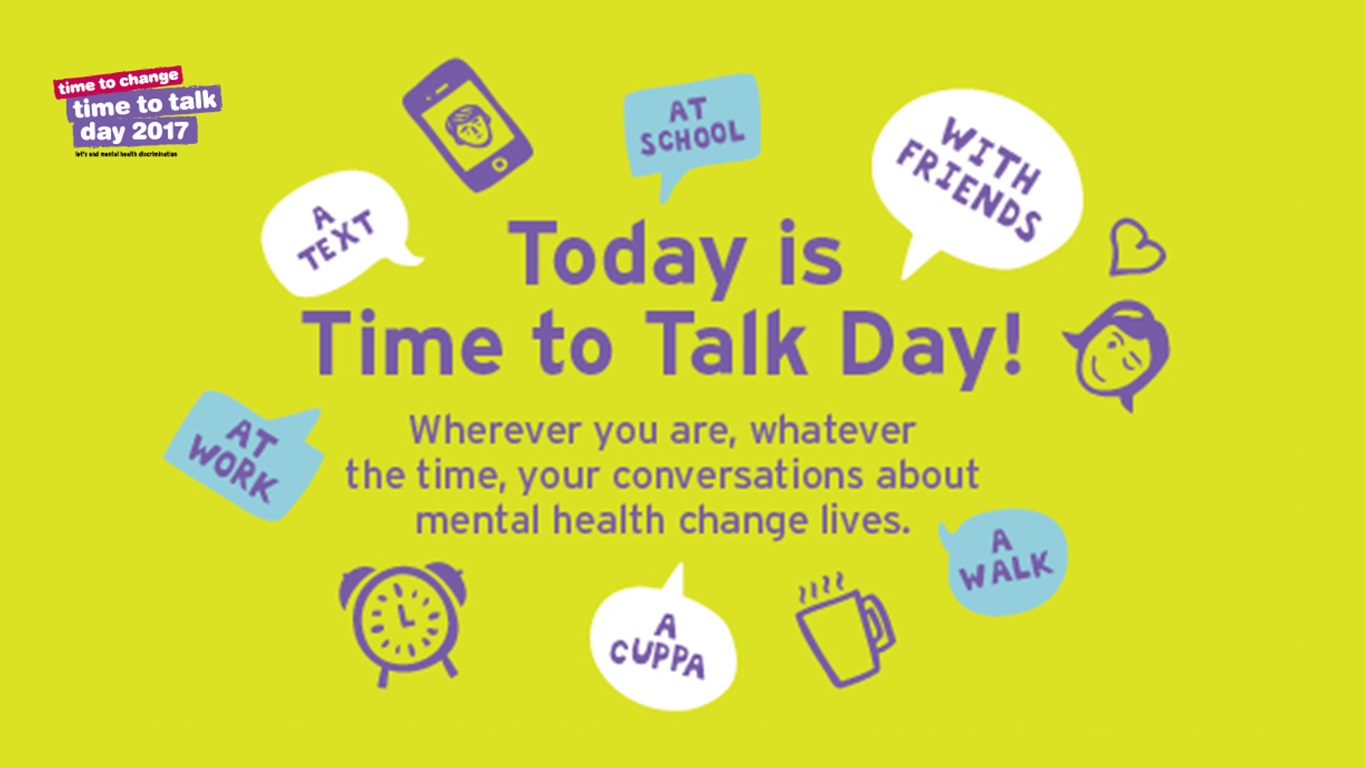Many of us will have taken a few days off to recover from winter coughs and colds in the past couple of months – but how many would admit to needing time off to recover from an attack of anxiety or depression?
Mental health problems can make everyday life difficult, just as physical problems can, and yet not enough people with mental health problems or mental illness are getting the help and support they need.
While public attitudes towards mental health and mental illness are improving - and there is a growing commitment among communities, workplaces, schools and within government to change the way we think about mental health - findings from the British Social Attitudes survey last year showed that discrimination remains one of the main problems faced by people with mental health problems.
But today, Time to Change is asking all of us to have a conversation about mental health and mental illness as part of Time to Talk Day 2017.
The aim is to give us all the chance to talk and listen about mental health, and realise that talking about mental health doesn’t need to be difficult.
It can be as simple as making time to have a cup of tea or go for a walk, and listening to someone talk about how they feel.
Because at the moment, too many people with mental health problems feel isolated and worried about how other people may react to hearing about their experiences.
And yet we know that talking can actually help to dispel myths and reduce stigmatising behaviours and opinions.
So what are the small things that you can do to make a difference? Here are a few helpful hints.
1) Find out more about mental health
Learning more about mental health problems can help us to feel more confident when talking about them or listening to someone else.
Mental health problems cover a broad range of different conditions and affect people in all walks of life and at any point in their lives, including new mothers, children, teenagers, adults and older people.
They are common, affecting 1 in 6 adults every week, and over half of mental health problems start before the age of 14.
There is also a wide range of treatment options, from talking to a counsellor or accessing mental health support online, to alternative therapies and medications. You can find more information on treating mental health on the NHS Choices website.
Knowing more about mental health conditions can also encourage us to take better care of our own mental health and wellbeing, for example incorporating the Five Ways to Wellbeing into daily life as much as possible, getting enough sleep and being mindful of stress.
2) Know the signs and how to ask for help
Mental illnesses can be very distressing and disabling for those affected, but outward signs range from the more visible, such as panic attacks or psychotic experiences, to the more hidden, such as feelings of sadness, anxiety or tiredness.
Everyone’s experiences of mental health issues will vary, but reliable information about the common signs and symptoms for different mental health conditions can be found online from reliable sources such as Rethink, Mind, and the Mental Health Foundation.
If recognising signs of distress in someone else it can be hard to know what to say, but it’s important to have the conversation and encourage them to seek help if needed.
It’s also important to be aware of your own mental health and wellbeing and to know when and how to ask for help if you need to.
NHS Choices provides information on the different types of help available, including self-help options, and offers a quick online test to Check Your Mood.
The Mental Health Foundation has developed a series of guides on how to look after mental health online. Whether you're concerned about yourself or a loved one, there are helplines that can offer expert advice.
3) Speak up and speak out
Finding out more about mental health and checking your own mood and sense of wellbeing can help to normalise mental health and make us more aware about what people with mental health problems might be experiencing.
Nine in ten people with a mental health problem experience stigma and discrimination, and we all have a part to play in helping to change this.
The Five Year Forward View for Mental Health sets out the Government’s commitment to improve attitudes to mental health by at least a further 5% by 2020/21 – and in partnership with Time to Change this will include developing local Time to Change Hubs, that will support and train people with lived experience to become mental health champions and influence change in attitudes and reductions in stigma in their local communities.
Moving forward on mental health
The commitment made by the Five Year Forward View for Mental Health was further underlined by a package of measures to improve mental health support in schools, workplaces and communities announced by the Prime Minister at the start of the year.
We published a toolkit for employers on supporting mental health in the workplace earlier this year with Business in the Community and will build on this shortly with further toolkits for employers on suicide prevention and post-vention.
We are also supporting this work through the development of a prevention concordat for mental health, which will support local areas to develop effective mental health prevention plans that include evidence-based activities to reduce stigma and discrimination, focusing on sustained behaviour change.
Since Time to Change began in 2007, 3.4 million adults in England have improved attitudes towards mental health problems.
There is still a long way to go – but we can all do our bit to help by taking the time to talk about mental health today. For more ways to get involved visit the Time to Change website.

